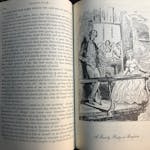More than one blurbist has compared Dawn Jewell, the narrator of Robert Gipe's debut illustrated novel, to Mattie Ross, the precociously stouthearted hero of Charles Portis' "True Grit." Glumly chinless in Gipe's drawings, Dawn is a pugnacious 15-year-old shuttling between houses in southeastern Kentucky's coal mining country. As with Hamlet, Dawn's father is dead, and her uncle is shacking up with her mother. Her mother is reliable only in the sense that she's reliably high. Her grandmother is agitating against a mountaintop-removal plan, a battle Dawn impulsively enters at a polarizing town meeting.
Meanwhile, Dawn has a blind crush on Willett Bilson, who spins punk records on the community radio station that his family operates in Tennessee. Sometimes he lets a whole album play so he can run out to feed the chickens.
Gipe lives in Harlan, Ky., where he teaches and co-produces plays developed from local oral histories, experience evident in his sensitivity to diverse viewpoints and his ear for spoken language. Dawn's narration is sometimes charmingly plain ("She held out a stick of gum to me. It was Juicy Fruit."), sometimes mystical, and she has a quirkily oracular way of getting to the essence of character. Here's how she sums up an aunt: "She was the one said the mashed potatoes weren't hot all the way through."
Dawn has been knocked around quite a lot, and at times she's misanthropic in a teen-carapace way. ("Trampoline" isn't being explicitly marketed as a YA novel, but it'd be nice if the younger set found it.)
As for Gipe, he's the best of populists: generous of spirit but not smarmy. There are some deeply flawed people in Dawn's circle (she's one of 'em), but they're never all bad, never unchangeable but never unrealistically transformed. Gipe has a gift for staging tender reconciliations that you suspect won't last through the afternoon.
Although the book wastes no time in setting up its civic, romantic and familial conflicts, its development is, well, not quite as "slow as church," to quote Dawn, but not swift. Dawn spends much of the book's first half inflicting violence on various relatives, vehicles and herself, and although these incidents aren't without purpose, a growing sense of aimlessness threatens until just past the book's midpoint.
Gipe lets Dawn set the scene and explain relationships at her leisure, a technique that for the most part draws us into the gradually forming picture. Sometimes, though, things could be established sooner and more firmly. We wait too long to learn how old Willett is (is the potential romance slightly problematic or wrong and illegal?), and there's a similarly unnecessary delay in spelling out the year of the action. It's 1998, it turns out, although at one point Willett mentions "a good band from the 90s," an odd thing to say when you're still in the '90s. Since I'm already caviling, I'll note too that Willett's good-natured older brother Kenny later turns into his uncle.
But to borrow from an old country song, "Trampoline" is ragged but right, and it builds to an effective blend of contrasting tones: world-weary yet hopeful, not too sentimental but — let's quote Dawn once more — "soft, like the sound a Christmas tree makes when you throw it over the hill."
Dylan Hicks is a writer, musician and the author of the novel "Boarded Windows."






